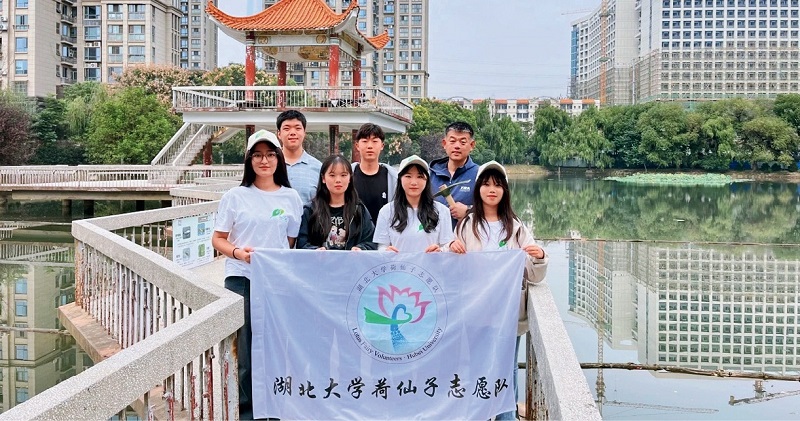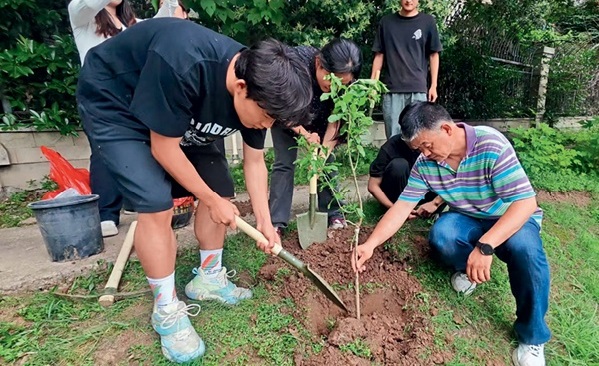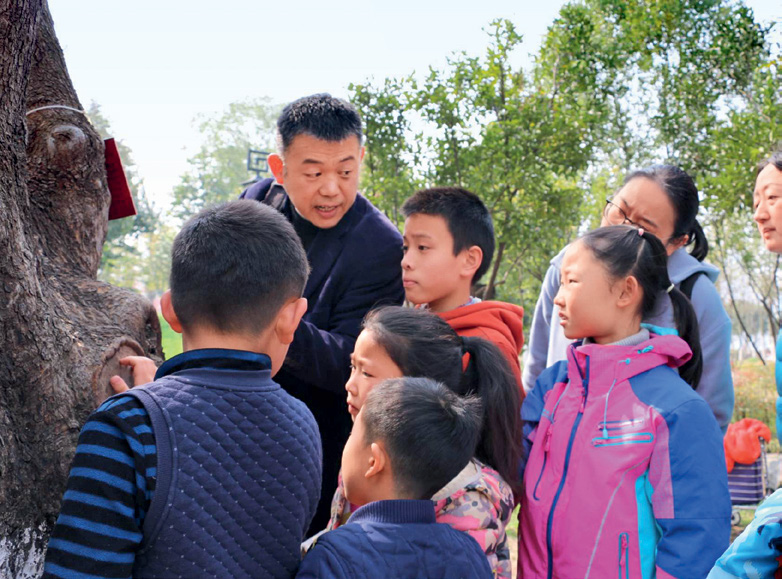It took Han Zhong and his teammates over two hours to walk more than 9.5 kilometers along the Qingshangang, a watercourse that feeds a local steel manufacturing giant in Wuhan, central China’s Hubei Province, on a sweltering summer day. They weren’t hiking enthusiasts nor seasoned athletes. They were exploring the city’s wetland landscape.
When they finally saw the source of Qingshangang, the fatigue gave way to exhilaration. “If you hadn’t brought us here and we wouldn’t have gone on such an activity, I would never have seen this view in my life,” said a team member. Han was deeply touched by those words as he realized how his work as a teacher at Hubei University could inspire and educate.
The walk is part of an initiative by Lotus Fairy Volunteers, an environmental protection group founded by Han and comprised of students from Hubei University, to help participants better understand the culture and geography of Wuhan’s wetlands. Since its inception in 2017, Lotus Fairy Volunteers has conducted various similar activities to promote hands-on environmental protection and encourage wider public participation.

Members of the Lotus Fairy Volunteers pose for a group photo at an ecological education corridor for small and micro wetlands that they built at Hubei University in Wuhan, central China’s Hubei Province on October 27, 2023.
Budding Lotus
Han has been a veteran of lake conservation since 2010. He first joined local organizations such as Green City of Rivers, focusing on the protection of urban lakes in Wuhan. In 2012, he was appointed as civilian chief of Shahu, a role dedicated to safeguarding and promoting the sustainable use of Shahu, which is a major lake in central Wuhan located within walking distance of Hubei University. Han frequently brought students to the lake for on-site classes, teaching them about its ecological value and the importance of protecting it. Yet, he felt these efforts were fragmented and lacked long-term continuity. To address this, he began envisioning a more structured and sustainable initiative.
The opportunity came in 2017 when Han pitched the idea of building an educational base for nature education that combines the resources and strengths of Shahu Park and Hubei University to the respective administrations. Both sides quickly embraced the idea, and Han moved forward by organizing a team of students to assist in promoting environmental knowledge related to Shahu.
On April 22, 2017, the Lotus Fairy Volunteers was established. Explaining the name, Han told China Today that “lotus” carries two layers of meaning. It is not only the official flower of Shahu Park but also a symbol of purity and elegance in Chinese culture. Han hoped the environment would be kept as pristine as the lotus itself, and that team members would embody the same qualities. The word “fairy,” meanwhile, reflects Han’s view of the volunteers as lively and full of vitality.
On the very day it was established, the Lotus Fairy Volunteers launched its first activity, guiding participants in Shahu Park to appreciate the beauty of flowers. Han recalled how the venue brimmed with children captivated by the subject, while curious parents crowded near the windows to listen in. The warm response inspired him to carry this work forward.

Han Zhong and his students plant trees by a small pond to create an edible garden on May 18, 2025.
Actions Speak Louder Than Words
Practical action lies at the heart of the Lotus Fairy Volunteers. The team’s student leader, Zainuer, is a Uyghur girl from Hetian in northwest China’s Xinjiang Uyghur Autonomous Region, where the prevalence of desert landscapes has instilled in her a love for nature and a desire to protect it. After learning about the team from her supervisor Han, and consulting with senior members, she decided to join. “I was most attracted by the team’s atmosphere,” Zainuer told China Today, “It is a caring group that walks the walk rather than talking the talk.”
According to Han, the Lotus Fairy Volunteers’ work mainly covers four areas, including lake protection, nature education, environmental governance, and ecological culture promotion. One distinctive aspect is transforming a small pond in the university into an garden of edible plants and vegetables.
Between Hubei University’s Wuchang campus and Shahu used to lie two small ponds. The eastern pond was filled with construction waste and gradually disappeared, while the western pond, covering about 10,000 square meters, suffered from severe pollution. Although the local government invested considerable resources in cleaning and managing it, the banks of the pond often remained neglected.
In 2023, Han led the Lotus Fairy Volunteers in transforming the western pond by establishing an ecological education corridor for small and micro wetlands. The team conducted detailed surveys of the pond’s flora and fauna, then based on their findings, they created educational billboards and hung them on the corridor and trees to educate the public, and drafted a conservation charter to encourage the protection of the pond. They also organized classes there on water-quality testing and bird observation, making the space both an ecological resource and a living classroom
In 2025, Han drew inspiration from the concept of an “edible garden” while attending the World Garden Show in Shahu Park. “Simply put, it means planting crops and vegetables in a garden rather than just flowers,” he explained. Soon after, he and his team began creating such a garden along the ecological corridor.
On the banks of the pond, some residents were already growing vegetables. Han invited them to join him in building the edible garden, suggesting that their knowledge of cultivating vegetables could be shared with others. They gladly agreed, noting that children passing by often ask them how the plants grow. Han also noticed several dead trees around the pond and organized Lotus Fairy Volunteers to replace them with fruit trees, which could provide food for some birds, thus allowing people to observe these birds.
Imagine a garden where visitors can both enjoy the natural environment and harvest fresh food, a space that embodies the idea of humans living in harmony with nature. Han is thrilled to deliver this vision. “From the ecological education corridor to the edible garden, we have participated in environmental governance, helping to enhance both our university’s surroundings and its image,” he said.
Beyond beautifying the campus, the garden serves as a hands-on classroom, helping educate students and local residents about sustainable planting, biodiversity, and ecological stewardship. It also encourages the community to take an active role in protecting the environment, demonstrating that small, everyday actions can contribute to larger conservation efforts.
Members of Lotus Fairy Volunteers have gained valuable insights through their work. “In the past, environmental protection was nothing more than a slogan to me,” said Zainuer. “But by joining the group’s activities, including testing water quality with my own hands, cleaning up litter, and observing ecological changes, I came to truly understand the fragility of ecosystems and our own vulnerability within them.” She added that these experiences made her realize that lucid waters and lush mountains can only endure if each of us takes concrete action to protect them.

Han Zhong conducts an open nature class for the public at Shahu Park on March 10, 2019. Photos courtesy of Han Zhong
Lotus’ Growing Appeal
Han hopes that the work of Lotus Fairy Volunteers will inspire not just group members, but a wider community, to take part in environmental protection. He recalls one telling moment: a branch on a young fruit tree they had planted was broken, and a local resident spontaneously tied a red plastic bag around it to protect it. On another occasion, the same man used a bamboo stick to support a loquat tree that had grown crooked. Such actions showed that their efforts were beginning to resonate beyond the team.
“Our environmental protection efforts have influenced and encouraged others to take similar actions, which I find very meaningful,” said Han, “One good action can inspire another good action, and that makes our work worthwhile. We can motivate more people to join in managing and protecting the environment.”
While engaging with the public, Lotus Fairy Volunteers encountered many challenges. For example, some anglers were fishing in prohibited areas and leaving trash behind. Although the team tried to persuade them not to do so, they realized the underlying issues were difficult to address. In response, they launched a program encouraging anglers to participate in the joint management and stewardship of rivers and lakes, which later received a provincial award.
Lotus Fairy Volunteers has made steady progress in expanding public participation. By 2025, the team had organized more than 80 hands-on nature education classes, directly engaging over 500 parents and children, while nearly 100,000 people participated online. Many members have also been recognized as Hubei Youth Environmental Ambassadors, a provincial initiative that appoints young people to advocate for and exemplify ecological protection.
In August 2024, Chinese President Xi Jinping replied to a letter from environmental volunteers at Danjiangkou in Hubei’s Shiyan City, which is the water source for the middle route of China’s South-to-North Water Diversion Project, encouraging the volunteers to motivate more people to consciously conserve water resources and work together to build a beautiful China.
Han emphasized that the Lotus Fairy Volunteers is actively answering Xi’s call and will remain committed to environmental protection. In his view, “lucid waters and lush mountains [Shahu being one example] are all around us.” He believes that even small actions in daily life can accumulate into a powerful collective force for preservation.
For the Lotus Fairy Volunteers, protecting the environment is never a walk in the park and more of an ongoing journey of exploration. The endeavor demands persistence and practical effort, yet the moment a healthier, more vibrant environment takes shape, the exhilaration it brings makes every step worthwhile.